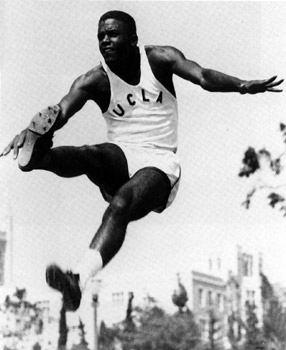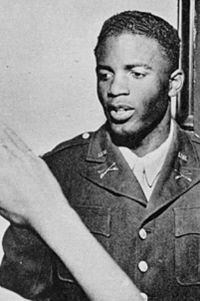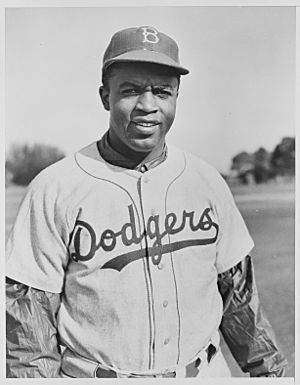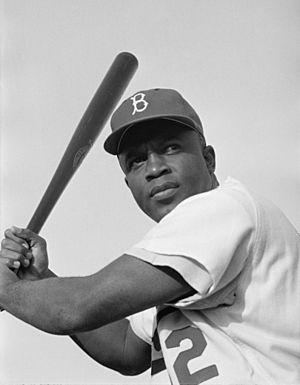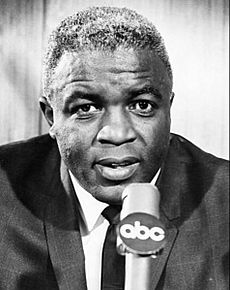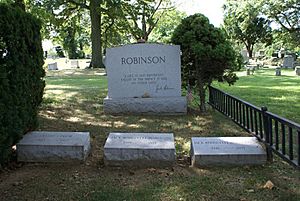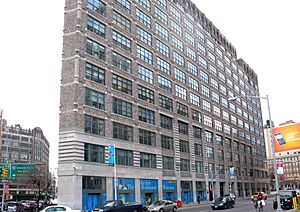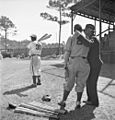Jackie Robinson facts for kids
Quick facts for kids Jackie Robinson |
|||
|---|---|---|---|
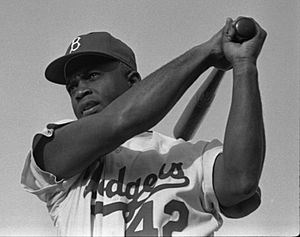 |
|||
| Second baseman | |||
| Born: January 31, 1919 Cairo, Georgia |
|||
| Died: October 24, 1972 (aged 53) Stamford, Connecticut |
|||
|
|||
| debut | |||
| April 15, 1947, for the Brooklyn Dodgers | |||
| Last appearance | |||
| October 10, 1956, for the Brooklyn Dodgers | |||
| Career statistics | |||
| Batting average | .311 | ||
| Hits | 1,518 | ||
| Home runs | 137 | ||
| Runs batted in | 734 | ||
| Stolen bases | 197 | ||
| Teams | |||
|
Negro leagues
Major League Baseball
|
|||
| Career highlights and awards | |||
|
|||
| Induction | 1962 | ||
| Vote | 77.5% (first ballot) | ||
Jack Roosevelt "Jackie" Robinson (January 31, 1919 – October 24, 1972) was a very important African-American Major League Baseball (MLB) player. He made history by breaking the "baseball color barrier" when he joined the Brooklyn Dodgers in 1947. This meant he was the first black man to openly play in the major leagues since the 1880s.
Before Jackie, black players could only play in special leagues called Negro leagues. Jackie's amazing skills and strong character helped end racial segregation in professional baseball. His actions were a big part of the civil rights movement in the United States.
Jackie had a fantastic baseball career. He played for ten seasons and helped the Dodgers win the World Series in 1955. He was chosen for six All-Star Games from 1949 to 1954. In 1947, he won the first MLB Rookie of the Year Award. He also won the National League Most Valuable Player Award in 1949, becoming the first black player to do so. In 1962, Jackie was put into the Baseball Hall of Fame. Later, in 1997, all MLB teams decided that no one else would ever wear his uniform number, 42. This was a huge honor!
Jackie was also famous for his work outside of baseball. He was the first African-American TV sports announcer for Major League Baseball. He also became the first African-American vice-president of a big American company. In the 1960s, he helped start the Freedom National Bank, which was owned and run by African-Americans in Harlem, New York. After he passed away, he was given the Presidential Medal of Freedom and the Congressional Gold Medal for all his achievements.
Contents
Jackie Robinson's Early Life
Jackie Robinson was born on January 31, 1919. His middle name, Roosevelt, was given in honor of former President Theodore Roosevelt.
In 1935, Jackie finished Washington Junior High School. Then he went to Muir Tech, which is now called John Muir High School. His older brothers saw how good he was at sports and encouraged him to keep playing. At Muir Tech, Jackie played many sports at the highest level for high school.
Jackie earned special awards for playing four different sports: football, basketball, track, and baseball. He played shortstop and catcher in baseball, quarterback in football, and guard in basketball. In track and field, he was great at the broad jump. He even played on the tennis team!
In 1936, Jackie won a tennis championship. He also made an all-star baseball team. A newspaper called him "the outstanding athlete at Muir" for his skills in many sports.
After Muir, Jackie went to Pasadena Junior College (PJC). He kept playing basketball, football, baseball, and track there. While playing football, he broke his ankle. This injury later caused some issues when he joined the military. Even with his injury, Jackie was one of the best athletes at PJC. He even broke school records for the broad jump that his brother, Mack, had set.
Like at Muir High School, most of Jackie's teammates at PJC were white. In 1938, he was chosen for the All-Southland Junior College Team for baseball. He was also named the region's Most Valuable Player. That year, Jackie was recognized for his "outstanding service to the school" and his good grades and character. This showed that Jackie was not just a great athlete, but also smart and a good person.
College Years at UCLA
After finishing PJC in 1939, Jackie went to UCLA. There, he met his future wife, Rachel. He became the first athlete at UCLA to earn special awards in four sports: baseball, basketball, football, and track. In 1939, he was one of four African-Americans on the UCLA Bruins football team. This made UCLA's team one of the most diverse in college football.
In 1941, Jackie went to Honolulu to play football for a team called the Honolulu Bears. This team had both black and white players. After a short season, Jackie came back to California. He thought about playing for the Los Angeles Bulldogs football team. But then, the Japanese attack on Pearl Harbor happened, and the United States entered World War II. This ended Jackie's football career.
Military Service
In 1942, Jackie was drafted into the Army. He was sent to a segregated (separate) Army unit in Fort Riley, Kansas. Jackie and other black soldiers applied to become officers. They were accepted and, in January 1943, Jackie became a second lieutenant. He was then moved to Fort Hood, Texas, where he joined the 761st "Black Panthers" Tank Battalion.
After leaving the Army, Jackie briefly returned to his old football club. Then, he took a job as the athletic director at Sam Huston College in Austin. He also coached the school's basketball team. Jackie was known as a coach who made his players work hard and earned their respect.
Jackie's Family Life
On February 10, 1946, Jackie married his girlfriend, Rachel Isum. She was a nursing student he had met at UCLA. They had three children: Jackie Jr., Sharon, and David. His family gave him the strong emotional support he needed during the tough times he faced as a black baseball player.
Baseball Career Highlights
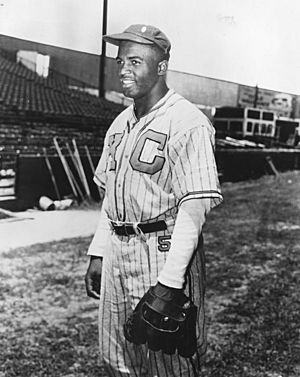
In early 1945, while Jackie was at Sam Huston College, the Kansas City Monarchs, a team in the Negro leagues, offered him a contract to play professional baseball. Jackie accepted the offer for $400 a month. This was a lot of money for him at the time. He played 47 games for the Monarchs.
Around the mid-1940s, Branch Rickey, the president of the Brooklyn Dodgers, started looking for black players to join his team. He chose Jackie Robinson from a list of African-American players. Rickey wanted Jackie to play for the Montreal Royals, which was the Dodgers' minor league team.
Rickey promised to sign Jackie before November 1, 1945. On October 23, it was announced that Jackie would play for the Royals in 1946. On the same day, Jackie signed his contract. This was called "The Noble Experiment." Jackie became the first black baseball player in the International League (a minor league) since the 1880s.
Just six days before the 1947 season began, the Dodgers brought Jackie up to the major leagues. On April 15, 1947, Jackie played his first major league game at Ebbets Field. More than 26,000 people watched, including over 14,000 black fans. Jackie was the first player since the 1880s to openly break the color barrier in major league baseball.
His amazing performance that year earned him the first Rookie of the Year Award. (At that time, there was only one award for both the National and American Leagues.)
Life After Baseball
Jackie Robinson stopped playing baseball on January 5, 1957. Later that year, he started having many health problems. Doctors found out he had diabetes. Jackie began taking insulin shots. However, the medicine back then wasn't as good at controlling the disease as it is today.
In 1962, Jackie was voted into the Baseball Hall of Fame. He was the first African-American to be honored in the museum in Cooperstown.
In 1965, Jackie became a sports announcer for ABC's baseball games. He was the first black person to do this. On June 4, 1972, the Dodgers officially retired his uniform number, 42. This means no other player on the Dodgers can ever wear that number again. He was also the first black person to become a vice president of a major American company. Jackie always felt that his business career helped advance the cause of African-Americans in the business world.
Jackie also led the National Association for the Advancement of Colored People's (NAACP) million-dollar Freedom Fund Drive in 1957. He was on the NAACP's board until 1967. In 1964, he helped start Freedom National Bank in Harlem. This bank was owned and run by African-Americans. He was also the bank's first Chairman of the Board. In 1970, Jackie started the Jackie Robinson Construction Company to build homes for families with low income.
Jackie Robinson's Death and Legacy
Problems with heart disease and diabetes made Jackie very sick. He was almost blind by the end of his life. On October 24, 1972, Jackie died at age 53 from a heart attack at his home in Stamford, Connecticut.
About 2,500 people came to Jackie's funeral service on October 27, 1972, in New York City. Many of his old teammates and other famous black baseball players helped carry his coffin. The Reverend Jesse Jackson gave a speech about Jackie's life. Tens of thousands of people lined the streets as the funeral procession went to Jackie's gravesite at Cypress Hills Cemetery in Brooklyn, New York. He is buried next to his son Jackie Jr. and his mother-in-law.
Jackie's Lasting Impact
After Jackie's death, his wife, Rachel, started the Jackie Robinson Foundation. This foundation helps students go to college by giving them scholarships. As of 2022, Jackie's daughter Sharon is still involved with the foundation. Also, people are still raising money to open the Jackie Robinson Museum in New York City.
Jackie's first game in the major leagues ended almost sixty years of segregation in professional baseball. This was known as the baseball color line. Jackie breaking this barrier and his success showed that the fight for equality was important for everyone. Martin Luther King, Jr. said that Jackie was "a legend and a symbol in his own time." In 1999, Jackie Robinson was named to the Major League Baseball All-Century Team.
Jackie once said about himself, "I'm not concerned with your liking or disliking me... all I ask is that you respect me as a human being."
Awards and Special Recognition
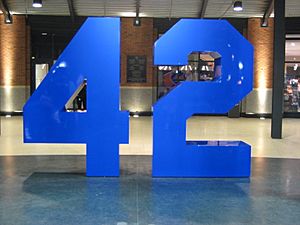
In 1947, a survey showed that Jackie Robinson was the second most popular man in the country, right after the singer Bing Crosby. In 1999, Time magazine put him on its list of the 100 Most Important People of the 20th Century. Also in 1999, he was ranked number 44 on the Sporting News list of the 100 Greatest Baseball Players.
Jackie was one of the first 25 people to be put into UCLA’s Athletics Hall of Fame in 1984. In 2002, he was on the list of 100 Greatest African Americans. The United States Postal Service has honored him on three different postage stamps.
Jackie Robinson has also been recognized outside of baseball. In December 1956, the NAACP gave him the Spingarn Medal. This award is given every year for the highest achievement by an African-American. President Ronald Reagan gave Jackie the Presidential Medal of Freedom on March 26, 1984, after Jackie had passed away.
On March 2, 2005, President George W. Bush gave Jackie's wife, Rachel, the Congressional Gold Medal. This is the highest award a civilian can get from Congress. Jackie was only the second baseball player to receive this award. In 2007, California Governor Arnold Schwarzenegger announced that Jackie was put into the California Hall of Fame.
Many buildings have been named after Jackie Robinson. A middle school in New York City is named after him. In 1976, his home in Brooklyn, the Jackie Robinson House, was named a special historic place. There is even an asteroid named after him, 4319 Jackierobinson. In 1997, the United States Mint made special coins to honor Jackie Robinson.
Famous Jackie Robinson Quotes
- "A life is not important except in the impact it has on other lives."
- "I'm not concerned with your liking or disliking me... all I ask is that you respect me as a human being."
- "Life is not a spectator sport. If you're going to spend your whole life in the grandstand just watching what goes on, in my opinion you're wasting your life."
- “There’s not an American in this country free until every one of us is free.”
- "The most luxurious possession, the richest treasure anybody has, is his personal dignity."
Fun Facts About Jackie Robinson
- While Jackie was in the Army at Fort Hood, he became friends with the famous boxer Joe Louis.
- Jackie's brother Mack raced against Jesse Owens in the 1936 Olympics.
- Jackie was arrested twice: once in 1938 for arguing with a police officer, and again in 1944 by military police for refusing to sit at the back of an army bus.
- Larry Doby became the second black player in Major League Baseball. Jackie and Larry often talked to each other.
- Jackie was excellent at bunting (a special way of hitting the ball). In 1947, he bunted 46 times, and almost all of them resulted in a hit or helped another player score.
- Jackie played himself in the 1950 Hollywood movie “The Jackie Robinson Story."
Images for kids
-
Lobby card for The Jackie Robinson Story, 1950, with Minor Watson (left, playing Dodgers president Branch Rickey) and Robinson
-
Robinson and his son David are interviewed during the March on Washington, August 28, 1963.
-
Rachel Robinson (holding the award) accepts the posthumous Congressional Gold Medal for her husband from President George W. Bush in a March 2, 2005, ceremony in the Capitol Rotunda. Also pictured are Nancy Pelosi and Dennis Hastert.
-
Statue of Robinson (1998) at Journal Square, Jersey City
See also
 In Spanish: Jackie Robinson para niños
In Spanish: Jackie Robinson para niños
 | Tommie Smith |
 | Simone Manuel |
 | Shani Davis |
 | Simone Biles |
 | Alice Coachman |


